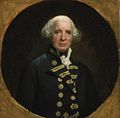Emanuel Howe, 2nd Viscount Howe
Emanuel Scrope Howe, 2nd Viscount Howe (c. 1700 – 29 March 1735) of
colonial administrator
.

Life
His father was Scrope Howe, a Whig Member of Parliament from whom he inherited the viscountcy and the Langar estate in 1713. In 1730 he inherited the Howe baronetcy, which was merged with the viscountcy.
He was elected Member of Parliament for
governor of Barbados until dying there of disease in 1735.[1]
Family
In 1719 he married
Ernest Augustus, Elector of Brunswick-Lüneburg, and his mistress Clara Elisabeth von Platen. In March 1720, her naturalisation as a British subject was approved by the House of Lords.[2]
Emanuel Howe is probably best known as the father of four sons, three of whom served in the British military and the fourth as a ship's commander. The eldest
American War of Independence. They simultaneously served as peace commissioners to the Second Continental Congress. Richard Howe later won greater fame on the Glorious First of June in 1794. Thomas Howe commanded ships for the East India Company and made observations on Madeira and the hitherto little known Comoro Islands
.
-
General George Howe
-
Admiral Richard Howe
-
A 1777 mezzotint of General Sir William Howe
References
- ^ Syrett, p. 1.
- ^ "House of Lords Journal Volume 21: March 1720, 21-30 Pages 276-286 Journal of the House of Lords: Volume 21, 1718-1721". British History Online. HMSO 1830. Retrieved 24 November 2022.
Bibliography
- Syrett, David. Admiral Lord Howe: A Biography. Spellmount, 2006.




